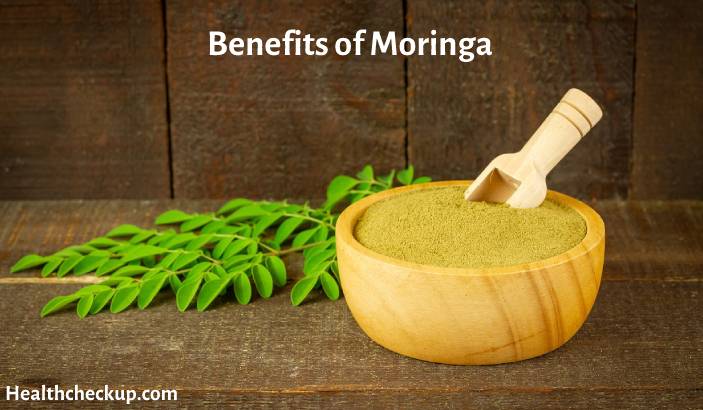Moringa is a plant native to parts of Africa and Asia that is known for its nutrient-rich leaves, seeds, and oil. Here are 20 potential benefits of moringa for hair, skin, and overall health:
- High in nutrients: Moringa is rich in a variety of nutrients, including vitamins A, C, and E, as well as minerals like calcium and iron.
- Improves skin health: Moringa oil is often used as a natural moisturizer and may help improve the appearance of dry or damaged skin.
- Supports hair growth: Moringa oil is rich in essential fatty acids, which may help promote healthy hair growth.
- Lowers blood sugar levels: Some research suggests that moringa may help lower blood sugar levels, which may be beneficial for people with diabetes.
- Reduces inflammation: Moringa contains antioxidants and anti-inflammatory compounds, which may help reduce inflammation in the body.
- Lowers blood pressure: Some research suggests that moringa may help lower blood pressure, which can help reduce the risk of heart disease.
- Improves cholesterol levels: Moringa may help improve cholesterol levels by reducing LDL (bad) cholesterol and increasing HDL (good) cholesterol.
- Boosts immune function: Moringa is rich in vitamins and minerals that are important for maintaining a healthy immune system.
- Has anti-cancer properties: Some research suggests that moringa may have anti-cancer properties, though more research is needed to fully understand its effects.
- Reduces the risk of heart disease: Moringa may help reduce the risk of heart disease by improving cholesterol levels and lowering blood pressure.
- Improves kidney function: Some research suggests that moringa may help improve kidney function and reduce the risk of kidney damage.
- Improves digestion: Moringa is high in fiber, which can help support healthy digestion and regular bowel movements.
- Improves bone health: Moringa is a good source of calcium, which is important for maintaining strong bones and reducing the risk of osteoporosis.
- Improves brain function: Moringa is rich in antioxidants and anti-inflammatory compounds that may help improve brain function and cognitive performance.
- Reduces the risk of anemia: Moringa is a good source of iron, which is important for preventing anemia and maintaining healthy red blood cells.
- Reduces the risk of malnutrition: Moringa is rich in nutrients, making it a potential option for improving nutrition in areas where access to a varied diet is limited.
- Improves respiratory health: Moringa may help improve respiratory health by reducing inflammation in the airways and helping to clear mucus.
- Reduces the risk of gastrointestinal disorders: Moringa may help reduce the risk of gastrointestinal disorders by reducing inflammation and improving digestion.
- Improves fertility: Some research suggests that moringa may improve fertility in women by regulating menstrual cycles and increasing the number of healthy eggs.
- Reduces the risk of certain types of cancer: Some research suggests that moringa may have anti-cancer properties and may help reduce the risk of certain types of cancer, including breast and colon cancer.
As with any supplement, it’s important to talk to a healthcare provider before adding moringa to your diet. More research is needed to fully understand the effects and optimal dosage of moringa.








